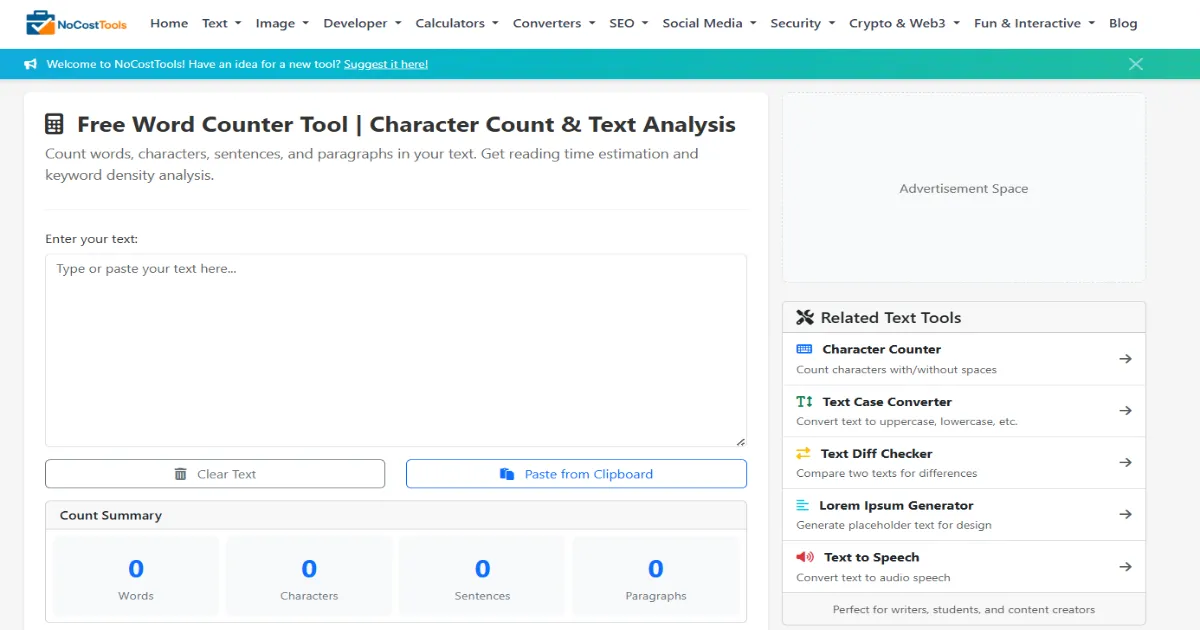In the digital age, free word counter tools have become indispensable for writers, students, content creators, and professionals who need to meet specific word count requirements. Whether you’re crafting an academic essay, writing a blog post, or creating social media content, understanding how to effectively use word counting tools can significantly improve your writing process and ensure you meet target lengths.
- What Are Free Word Counter Tools?
- Why Use Online Word Counter No Registration Tools?
- Essential Features of Academic Writing Word Counter Tools
- Character Counter for Social Media: Platform-Specific Requirements
- How to Choose the Best Free Word Counter Tool
- Common Use Cases for Free Word Counter Tools
- Advanced Text Analysis Features
- Best Practices for Using Word Counter Tools
- Integration with Writing Workflows
- Future of Word Counting Technology
- Conclusion
This comprehensive guide explores everything you need to know about free word counter tools, their features, benefits, and how to choose the best one for your specific needs.
What Are Free Word Counter Tools?
Free word counter tools are online utilities that automatically count words, characters, sentences, and paragraphs in any given text. These tools have evolved from simple counters to sophisticated text analysis platforms that provide insights into reading time, keyword density, and writing statistics.
Best free word counter for essays and academic writing requires accuracy that matches professional standards used by Microsoft Word, Google Docs, and other leading word processors. Modern online word counters achieve this level of precision while offering additional features that traditional software often lacks.
Why Use Online Word Counter No Registration Tools?
The primary advantage of using an online word counter no registration service is immediate access without barriers. Traditional methods of word counting often require:
- Software downloads and installations
- Account creation and email verification
- Premium subscriptions for advanced features
- Compatibility issues across different devices
Free online word counters eliminate these obstacles, providing instant access to professional-grade text analysis tools. NoCostTools’ Word Counter exemplifies this approach, offering comprehensive text analysis without requiring any user registration or personal information.
Essential Features of Academic Writing Word Counter Tools
Real-Time Text Analysis
Modern academic writing word counter tools provide instant feedback as you type or paste content. This real-time analysis includes:
- Word count accuracy matching academic standards
- Character counting with and without spaces
- Sentence structure analysis for readability assessment
- Paragraph organization tracking for proper formatting
Advanced Statistical Insights
Professional word counters go beyond basic counting to provide:
- Average word length calculations for vocabulary assessment
- Unique word identification to measure vocabulary diversity
- Keyword density analysis for SEO and content optimization
- Reading level assessment based on sentence complexity
Reading Time Estimation
Word counter with reading time features have become essential for content creators planning user engagement. These tools calculate:
- Reading time estimation based on average reading speeds (200-250 words per minute)
- Speaking time calculation for presentations (130-150 words per minute)
- Scanning time estimates for quick content review
Character Counter for Social Media: Platform-Specific Requirements
Social media platforms impose strict character limits, making character counter for social media functionality crucial for digital marketers and content creators:
Platform-Specific Limits
- Twitter/X : 280 characters per tweet
- Instagram captions : 2,200 characters maximum
- Facebook posts : 63,206 characters (optimal: 40-80 characters for engagement)
- LinkedIn posts : 3,000 characters (optimal: 150-300 characters)
- YouTube descriptions : 1,000 characters for optimal display
Character Counter tool provides real-time tracking for all major social media platforms, ensuring your content fits within platform requirements while maximizing engagement potential.
How to Choose the Best Free Word Counter Tool
Accuracy Standards
The best word counter tools should match the counting methodology of professional writing software:
- Word Definition : Strings of characters separated by spaces or punctuation
- Hyphenated Words : Counted as single units (e.g., “twenty-one” = 1 word)
- Contractions : Treated as single words (e.g., “don’t” = 1 word)
- Numbers : Counted as words when part of text flow
Privacy and Security
Professional word counters should process text locally in your browser, ensuring:
- No data transmission to external servers
- Complete privacy protection for sensitive content
- No storage of personal or professional documents
- Secure processing without registration requirements
Additional Features
Look for word counters that offer:
- Multiple text analysis formats
- Export capabilities for reports and documentation
- Integration options with writing workflows
- Mobile optimization for cross-device usage
Common Use Cases for Free Word Counter Tools
Academic Writing Applications
Students and researchers rely on word counters for:
- Essay length compliance with assignment requirements
- Research paper formatting according to academic standards
- Abstract optimization within word limits (typically 150-300 words)
- Thesis chapter management for consistent section lengths
Content Creation and SEO
Digital marketers and content creators use word counters for:
- Blog post optimization (1,500-3,000 words for SEO effectiveness)
- Meta description crafting (150-160 characters for search engines)
- Social media content planning within platform constraints
- Email marketing subject line optimization (30-50 characters)
Professional Writing
Business professionals utilize word counters for:
- Report standardization across departments
- Proposal length management to meet client requirements
- Executive summary creation (typically 1-2 pages)
- Presentation script timing based on speaking pace
Advanced Text Analysis Features
Keyword Density Analysis
Modern word counters provide keyword density metrics essential for:
- SEO content optimization (1-3% keyword density recommended)
- Content relevance assessment for target topics
- Competitive content analysis compared to ranking pages
- Natural language processing to avoid over-optimization
Readability Assessment
Professional tools analyze text readability through:
- Flesch Reading Ease scores (60-70 ideal for general audience)
- Grade level analysis for target audience appropriateness
- Sentence complexity evaluation for clarity improvement
- Passive voice detection for active writing encouragement
Best Practices for Using Word Counter Tools
Writing Process Integration
Effective word counter usage involves:
- Initial Planning : Estimate target word counts for each section
- Draft Monitoring : Regular checking during writing process
- Final Verification : Comprehensive analysis before submission
- Revision Guidance : Using statistics to identify improvement areas
Quality Over Quantity
While meeting word count requirements is important, focus on:
- Content value over arbitrary length requirements
- Natural language flow rather than forced expansion
- Reader engagement through meaningful information
- Purpose fulfillment aligned with content objectives
Integration with Writing Workflows
Cross-Platform Compatibility
The best word counter tools work seamlessly across:
- Desktop browsers for comprehensive writing projects
- Mobile devices for quick content checks
- Tablet interfaces for flexible writing environments
- Various operating systems without compatibility issues
Export and Reporting
Professional word counters should offer:
- Statistical reports for writing analysis
- Progress tracking across multiple projects
- Team collaboration features for group projects
- Integration capabilities with popular writing platforms
Future of Word Counting Technology
AI-Enhanced Analysis
Emerging word counter tools incorporate:
- Artificial intelligence for content quality assessment
- Natural language processing for style improvement suggestions
- Automated editing recommendations for clarity enhancement
- Contextual analysis for audience-appropriate content
Enhanced Collaboration
Next-generation tools focus on:
- Real-time collaboration for team writing projects
- Version control for document revision tracking
- Multi-user access with role-based permissions
- Cloud synchronization across devices and platforms
Conclusion
Free word counter tools have evolved from simple counting utilities to comprehensive text analysis platforms essential for modern writing workflows. Whether you need an academic writing word counter for scholarly work, a character counter for social media campaigns, or a comprehensive online word counter no registration solution for professional projects, choosing the right tool significantly impacts your writing efficiency and success.
The key is selecting a word counter that combines accuracy, privacy, and advanced features while remaining accessible across all your devices and writing scenarios. Tools like NoCostTools’ comprehensive text analysis suite provide the perfect balance of functionality and ease of use, supporting writers, students, and content creators in achieving their goals without barriers or limitations.
By understanding the features, benefits, and best practices outlined in this guide, you can maximize the value of free word counter tools and enhance your writing process across all personal, academic, and professional applications.
Related Tools:
- Word Counter – Professional word and character counting
- Character Counter – Social media character tracking
- Text Case Converter – Format text for consistency
- Lorem Ipsum Generator – Create placeholder text for design projects













thc gummies for stress relief with lab tested potency